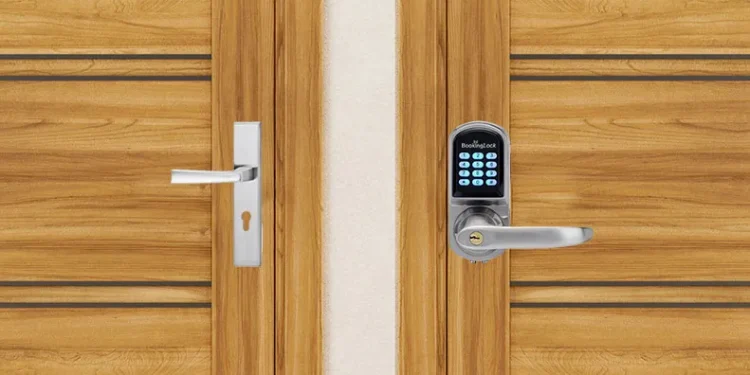Electromagnetic Door Locks vs. Traditional Locks
The Whimsical world of Electromagnetic Door Locks
Ah, the electromagnetic door lock, a dazzling gizmo that has flipped the switch on traditional security measures. Picture this: the magic of magnetism rendering keys almost obsolete. There’s something wildly futuristic about a door that clings shut via electromagnetism. Like a spellbinding piece of a sci-fi puzzle, these locks are more than mere mortal devices—they’re the Gandalf of gateways: “You shall not pass!” Well, unless you know the trick.
Let’s dip our toes into the intriguing waters of these locks. On one hand, they offer simplicity—a swift swipe here, a gentle push there. Imagine it; you stroll up to your door with the confidence of someone who knows they aren’t fumbling for keys. It’s like having a pocket-sized butler holding the door at your convenience. A touch here, a beep there, and voilà! You’re in.
These locks whisper ease at every turn. Installation can often be breezy, a mere afternoon task. No PhD in engineering needed. Plus, say goodbye to having duplicates made for everyone and their grandmother. Here, a nifty access code or a sleek card does the trick.
Another feather in their cap is security. Electromagnetic door locks clamp down like a dragon’s jaw. They pose a formidable challenge to would-be intruders who might as well attempt a battle with a fantasy creature. Power outage, you say? Fear not, my friend! A trusty battery backup or mechanical key can save the day—a delightful nod to practicality.
But hold the horn; it’s not all rainbows and butterflies. For those who crave the thud of a hefty bolt securing their abode, these locks may seem less tangible. When the electrons stop dancing during a power outage, the magic falters, and those buzzing mechanisms revert to powerless heaps. That power dependence could feel like waiting for the cable guy who promised to be there between one and five, only to find yourself still perched by the window as the sun sets.
Also, let’s talk dollars and cents. These curious contraptions have a knack for pinching wallets a bit harder than old-school locks. While the long-term savings on key-cutting and potential repairs could offer solace, the initial price tag might leave you pausing, hand midway to your purse. It’s like weighing a weekly gourmet coffee habit against a one-time splurge at a swanky café.
Consider the wear and tear from relentless electromagnetic action. They can succumb to the cruel passage of time, demanding tender, sometimes costly, care. It’s like owning a vintage car; glorious to show off but occasionally thirsty for a mechanic’s attention. Routine check-ups are wise if you want these bad boys functioning at their prime.
The Quirks and Safety of Electromagnetic Door Locks
So, let’s dive into the shimmering world of gadgets and gizmos, focusing on the electrified sentinels known as the electromagnetic door locks. But are they as secure as traditional locks, or are they just shiny distractions?
Picture this: you’re dashing out the door, veggies in one hand, phone in the other, already running late. You simply tap your card, and click! Door’s locked tighter than the lid on a jam jar your granny just can’t open. It’s hard to argue against the convenience of electromagnetic locks. They use a magnetic field to keep doors secure, and the absence of bolts means fewer mechanical failures. Still, their apparent simplicity has people scratching their heads and asking: “Are they actually reliable?”
To help unravel this, let’s journey to a mysterious land called Electrostan—well, sort of. This is where wires meet magnets in a marriage that powers these locks. Their design offers significant resistances. They do not have a key slot, so no fumbling for keys required. On the flip side, the lack of a tumbler system means traditional lock-picking skills are bunk here—but rest assured, it doesn’t imply that burglars might try to bypass the system using some high-tech hocus-pocus.
Despite their high-tech allure, electromagnetic locks also attract a few hiccups. For instance, what happens when the power’s out? Suddenly, your fortress of solitude becomes as defenseless as a paper house against a storm. Of course, many setups incorporate battery backups, but when even those fail, you’re in for quite the conundrum! Picture yourself stuck outside, shaking your fist at the sky. Now, let’s not get too dramatic—the main takeaway here is to make sure you have a Plan B, like a mechanical key override or a cup of coffee to wait it out.
As often happens when new technology emerges, skeptics raise their eyebrows high enough to rival their hairlines. They argue that electronic wizardry can be hacked as easily as a toddler raids a cookie jar. Cybersecurity for electromagnetic locks has indeed been a topic of debate. Experts counsel continuous updates to their electronic systems, just like you bug your grandpa to update his email password—a necessary evil in the digital age.
















